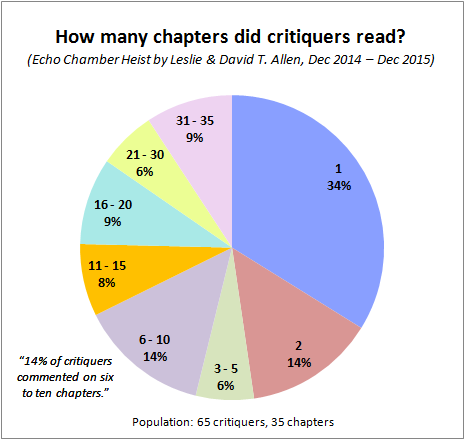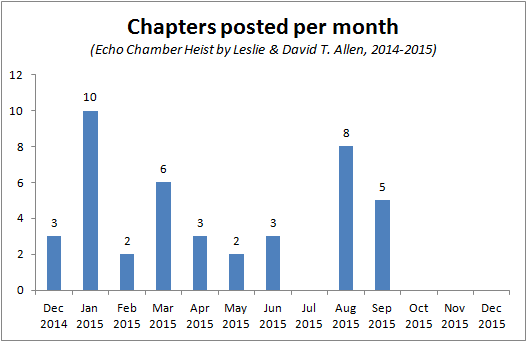Analysis: Chapters Per Critiquer (2015)
 January 23, 2016
by
David T. Allen
January 23, 2016
by
David T. Allen
Last year, 65 critiquers gave feedback on Echo Chamber Heist in our online writing community. This article explores how many chapters each critiquer read and why people stopped reading when they did.

| Critiques Finished | Number of People | |
|---|---|---|
| 1 | 22 | 34% |
| 2 | 9 | 14% |
| 3 – 5 | 4 | 6% |
| 6 – 10 | 9 | 14% |
| 11 – 15 | 5 | 8% |
| 16 – 20 | 6 | 9% |
| 21 – 30 | 4 | 6% |
| 31 – 35 | 6 | 9% |
Twenty-two people read only one chapter; generally, this was chapter one. Here’s why people quit so early:
-
Many people quit a few weeks after they join. We actively sought new members for a while, then discovered they were unreliable long-term partners.
-
Some people bounce around and critique what’s recommended by the app. They might just critique a middle chapter, which we generally find unhelpful since they ask questions that were answered in previously chapters.
-
We added bonus points to the first few chapters for a while, hoping it would hook long-term readers. Generally, this attracted people seeking points instead of long-term swaps. Their feedback wasn’t useful, so we stopped this.
-
We didn’t critique back. We tried to return critiques for anyone that gave good advice, but there are just too many people and not enough time. We now focus on fewer people.
- We asked two people to stop because they were unhelpful and degrading. They hated things that over sixty other people loved, marking them as non target readers. Their feedback was worded such that it deflated us instead of pumping us up for edits. Sometimes, it’s best to sever ties.
Some people stopped in the middle. Here’s what I think happened:
-
We were a member of a few weekly crit groups. All of the groups’ styles favored getting many critiques on just a few chapters at a time. This meant you had to wait months for feedback on later chapters, which is what we were most interested in. It also meant people weren’t reading it like normal readers; too much time passed between chapters. Furthermore, everyone often had similar advice, so the effort was greater than the payoff.
We think blitzing full manuscripts, one critiquer/beta reader at a time, may be better since the swap exposes big picture issues right away. You have an opportunity to fix any problems you agree with, then the next critiquer gives feedback on the changes. If multiple readers complain about something you originally disagreed with, you probably should take their advice and make the change.
Full manuscript trades also seem better because these critiquers are reading your manuscript quickly, which is closer to an actual reader.
Both of these groups disbanded somewhere in the middle of our manuscript.
-
Some partners wandered off and formed other connections. Perhaps we reciprocated too slowly, or they found someone they were more compatible with, or they just wanted feedback on early chapters we had already read. They may have also lost interest in our story; if that’s the case, it’s unfortunate, since that’s who we want to hear from the most.
-
Some people are reading our story just because they like it, and we don’t have an agreement to trade critiques. Once again, we’d love to return one-for-one critiques but there’s only so much time. Because they don’t benefit, we’re less of a priority (and rightly so).
-
Some are passive critiquers, who just drop by the community every once in a while.
-
A few people had a hard year, and had to leave the community to focus on family or career problems.
-
The last thirteen chapters weren’t posted until September. We posted as we wrote and sometimes focused on editing earlier chapters instead of writing new ones, since new people kept critiquing early chapters.
This meant the first ten chapters were well polished, but it took a while to complete a first draft.
Some people had read up until the last chapter we had posted in June, then had nothing new to read for over a month. They either left the community or started critiquing something else.
Six people read the full manuscript.
-
Some were full swaps, where we each agreed to finish the others’ manuscript within 2-4 weeks.
- Some were long time critique buddies.
Plans for 2016
This year, we won’t join groups that take over a month to get full manuscript feedback. Slowly getting feedback from multiple viewpoints was helpful, to a point, since this was our first full-length book. We’re aware of many of our weaknesses now, so it’s time to try something different.
We’ll try to finish a first draft of book two in a few months, iterate on it alone, then maybe post the full story for feedback. We’re unsure if we’ll continue using this community for full-length novels. I’d love to experiment with local, in-person writing groups.
After the manuscript is complete, we’re going to take a month-long break. Working fast should allow us to walk away from it a few times, and fresh eyes are better at finding big-picture mistakes. Hopefully, we’ll finish faster, and eventually complete more than one book a year.
We won’t critique all year long. Doing something every week (aside from writing and editing) is a drag. We thrive on variety.


